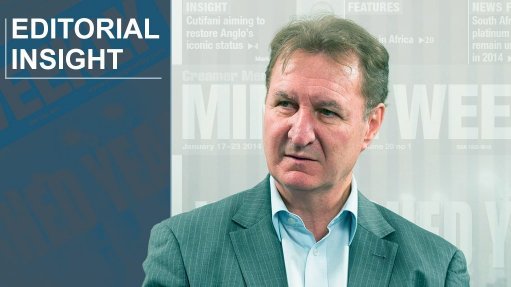
Mines and energy are joined at the hip, which means the appointment of a Minister of Mineral Resources and Energy makes sense. But, then again, mines and the environment, water, trains, roads and ports are also very much in the mix. Does that mean South Africa needs a single Ministry of mines, energy, the environment, water and transport?
No, but what it does mean is that these departments need to cluster for efficient decision-making and proper enabling.
The appointment of Gwede Mantashe has been met very favourably and we hope he gets the message about the extreme importance of renewable energy in all this.
Does he realise that he is now saddled with the globally acknowledged noble role of obtaining energy that is as clean as a whistle from the sun and the wind?
Renewable energy has become a cut-and-dried business case that must be pursued for good business reasons and what is so wonderful about it is that it also comes with exciting job generation and climate change mitigation.
Not only does this country have superior sunlight and prime wind corridors, but it also has platinum group metals (PGMs) that are inextricably linked to making the world a cleaner place and one less exposed to the impacts of climate change.
Could we be in a better place?
Hydrogen is the most abundant gas on earth and is also very much in contention globally. Where hydrogen goes, platinum should automatically follow, because of what it can do to generate clean electricity from hydrogen, but this may fail to be upheld if platinum’s trumpet is not blown far louder.
South Africa sits on a treasure chest of PGM riches and needs to let the world know how great these metals are and what they can do to combat climate change.
While more vehicle manufacturers are acknowledging that platinum-catalysed hydrogen fuel cells are the sole route to 100% carbon-free driving, platinum’s own catalytic prowess is in danger of being under acknowledged.
To stop this, a collective South African effort will be needed to spotlight the metal’s deftness. Needing to be dispelled is the notion that platinum has security-of-supply issues because it has to be sourced from South Africa, which is seen as a country from which supply dependence should be avoided and one which suffers from high built-in costs.
It would be an extremely good idea for platinum-linked labour unions to form part of global roadshows to counteract this notion and to tell the story of platinum’s unrivalled adroitness in catalysing clean-as-a-whistle electrical power for cars, trucks, buses, trains, trams and ships.
The great role that platinum can play should be smartly marketed in the context of the global battle to protect the environment.